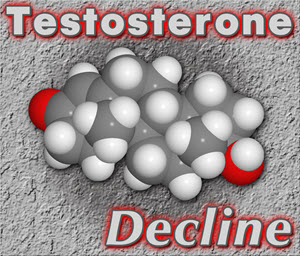Introduction to Endocrine and Neurological Interplay
Endocrine disorders and neurological conditions often intersect, creating complex health challenges for American men. The endocrine system, responsible for hormone production and regulation, can be significantly impacted by neurological disorders, leading to a myriad of symptoms and complications. Understanding this interplay is crucial for effective management and improved quality of life.
Common Endocrine Disorders in Men with Neurological Conditions
Men with neurological disorders such as Parkinson's disease, multiple sclerosis, or traumatic brain injuries may experience a range of endocrine issues. Hypothyroidism, diabetes mellitus, and hypogonadism are among the most prevalent endocrine disorders in this population. For instance, Parkinson's disease can lead to decreased dopamine levels, which may affect the pituitary gland and subsequently thyroid function. Similarly, multiple sclerosis can disrupt the hypothalamic-pituitary axis, leading to hormonal imbalances.
Diagnostic Challenges and Strategies
Diagnosing endocrine disorders in men with neurological conditions can be challenging due to overlapping symptoms. Fatigue, cognitive impairment, and mood changes can be attributed to both neurological and endocrine issues. To navigate these challenges, healthcare providers must employ a comprehensive diagnostic approach. This includes thorough medical history reviews, physical examinations, and targeted laboratory tests such as thyroid function tests, blood glucose levels, and hormone panels. Imaging studies like MRI or CT scans may also be necessary to assess the integrity of the hypothalamic-pituitary axis.
Management Approaches for Endocrine Disorders
Effective management of endocrine disorders in men with neurological conditions requires a multidisciplinary approach. Endocrinologists, neurologists, and primary care physicians must collaborate to tailor treatment plans that address both the neurological and endocrine aspects of the patient's health. For instance, men with hypogonadism may benefit from testosterone replacement therapy, which can improve energy levels, mood, and muscle mass. Similarly, managing diabetes in this population may involve a combination of lifestyle modifications, oral medications, and insulin therapy, with careful monitoring to prevent hypoglycemia.
Lifestyle Interventions and Support
Lifestyle interventions play a critical role in managing endocrine disorders in men with neurological conditions. Regular physical activity, balanced nutrition, and stress management techniques can help mitigate symptoms and improve overall well-being. For example, a diet rich in omega-3 fatty acids and antioxidants may support thyroid health, while regular exercise can enhance insulin sensitivity and glucose control. Additionally, support groups and mental health services can provide invaluable emotional support and coping strategies for men navigating these complex health challenges.
Emerging Research and Future Directions
Ongoing research continues to shed light on the intricate relationship between the endocrine and neurological systems. Recent studies have explored the potential benefits of novel therapies such as stem cell treatments and targeted hormone therapies for men with neurological conditions and endocrine disorders. As our understanding of these complex interactions grows, so too will our ability to develop more effective and personalized treatment approaches.
Conclusion: A Holistic Approach to Care
Managing endocrine disorders in American men with neurological conditions requires a holistic and integrated approach. By understanding the interplay between these systems and employing comprehensive diagnostic and management strategies, healthcare providers can significantly improve patient outcomes. As research advances, the future holds promise for even more effective interventions, offering hope and improved quality of life for men facing these challenging health conditions.
Contact Us Today For A Free Consultation

- Hormonal Imbalances and Sleep Disorders: Impact on American Men's Health and Interventions [Last Updated On: March 7th, 2025] [Originally Added On: March 7th, 2025]
- Vitamin D's Crucial Role in Endocrine Health for American Males [Last Updated On: March 16th, 2025] [Originally Added On: March 16th, 2025]
- Endocrinology's Role in Managing Chronic Fatigue in American Males [Last Updated On: March 17th, 2025] [Originally Added On: March 17th, 2025]
- Dietary Strategies for Enhancing Endocrine Health in American Men [Last Updated On: March 19th, 2025] [Originally Added On: March 19th, 2025]
- Endocrinology's Impact on Weight Management for American Males: Hormones and Strategies [Last Updated On: March 19th, 2025] [Originally Added On: March 19th, 2025]
- Hormonal Changes in Aging American Men: Impacts and Management Strategies [Last Updated On: March 19th, 2025] [Originally Added On: March 19th, 2025]
- Endocrine Health and Cancer Risk in American Men: A Comprehensive Analysis [Last Updated On: March 19th, 2025] [Originally Added On: March 19th, 2025]
- Autoimmune Endocrine Disorders in Males: Symptoms, Diagnosis, and Treatment Strategies [Last Updated On: March 19th, 2025] [Originally Added On: March 19th, 2025]
- PCOS in Transgender Men: Diagnosis, Management, and Holistic Care Approaches [Last Updated On: March 20th, 2025] [Originally Added On: March 20th, 2025]
- Endocrine Disruptors: Impact on American Male Health and Mitigation Strategies [Last Updated On: March 21st, 2025] [Originally Added On: March 21st, 2025]
- Lifestyle Impacts on Endocrine Health: A Guide for American Men [Last Updated On: March 21st, 2025] [Originally Added On: March 21st, 2025]
- Hormonal Optimization in Sports: Enhancing Performance Ethically for American Male Athletes [Last Updated On: March 21st, 2025] [Originally Added On: March 21st, 2025]
- Male Infertility and Endocrinology: Understanding Hormonal Impacts on Fertility [Last Updated On: March 21st, 2025] [Originally Added On: March 21st, 2025]
- Gout in American Males: Endocrine Influences and Management Strategies [Last Updated On: March 22nd, 2025] [Originally Added On: March 22nd, 2025]
- Endocrinology's Impact on Sexual Health in American Males: Hormones, Dysfunction, and Holistic Care [Last Updated On: March 22nd, 2025] [Originally Added On: March 22nd, 2025]
- Hormonal Imbalances and Kidney Health: Critical Insights for American Men [Last Updated On: March 23rd, 2025] [Originally Added On: March 23rd, 2025]
- Endocrine Health and Mental Well-being: A Comprehensive Guide for American Males [Last Updated On: March 23rd, 2025] [Originally Added On: March 23rd, 2025]
- Alcohol's Impact on Endocrine System in American Males: A Comprehensive Analysis [Last Updated On: March 23rd, 2025] [Originally Added On: March 23rd, 2025]
- Hormonal Influences on Joint Health in American Men: A Comprehensive Guide [Last Updated On: March 23rd, 2025] [Originally Added On: March 23rd, 2025]
- Hormonal Impacts on Men's Immune Health in the U.S.: Insights and Strategies [Last Updated On: March 24th, 2025] [Originally Added On: March 24th, 2025]
- Hormonal Imbalances and Their Role in Managing Male Depression in America [Last Updated On: March 24th, 2025] [Originally Added On: March 24th, 2025]
- Managing Endocrine Disorders in American Men with Autoimmune Diseases: A Comprehensive Guide [Last Updated On: March 24th, 2025] [Originally Added On: March 24th, 2025]
- Hormonal Dynamics and Skin Health in American Men: Androgens, Acne, Aging, and Lifestyle [Last Updated On: March 24th, 2025] [Originally Added On: March 24th, 2025]
- Endocrine Health and Prostate Cancer: Insights for American Men [Last Updated On: March 25th, 2025] [Originally Added On: March 25th, 2025]
- Managing Endocrine Disorders and Heart Disease in American Men: Strategies and Insights [Last Updated On: March 25th, 2025] [Originally Added On: March 25th, 2025]
- Exercise Impacts on Endocrine Function in American Males: Hormonal Health Benefits [Last Updated On: March 25th, 2025] [Originally Added On: March 25th, 2025]
- Endocrine Disorders in Men: Impact on Skin Health and Management Strategies [Last Updated On: March 25th, 2025] [Originally Added On: March 25th, 2025]
- Managing Type 2 Diabetes in American Men: Endocrine Insights and Strategies [Last Updated On: March 25th, 2025] [Originally Added On: March 25th, 2025]
- Endocrine System and Liver Health in American Males: A Comprehensive Analysis [Last Updated On: March 25th, 2025] [Originally Added On: March 25th, 2025]
- Endocrine and Gastrointestinal Health Management Strategies for American Men [Last Updated On: March 25th, 2025] [Originally Added On: March 25th, 2025]
- Hormonal Influences on Muscle Health in American Males: A Comprehensive Overview [Last Updated On: March 25th, 2025] [Originally Added On: March 25th, 2025]
- Endocrine Health's Impact on Respiratory Function in American Males: A Comprehensive Overview [Last Updated On: March 25th, 2025] [Originally Added On: March 25th, 2025]
- Exploring ADHD and Endocrinology: Hormonal Imbalances and New Treatment Avenues [Last Updated On: March 26th, 2025] [Originally Added On: March 26th, 2025]
- Exploring Endocrinological Interventions for PTSD in American Males [Last Updated On: March 26th, 2025] [Originally Added On: March 26th, 2025]
- Endocrinology's Role in Managing Insomnia Among American Males [Last Updated On: March 26th, 2025] [Originally Added On: March 26th, 2025]
- Endocrinology's Vital Role in Treating Male Eating Disorders in the U.S. [Last Updated On: March 26th, 2025] [Originally Added On: March 26th, 2025]
- Stress Impact on Male Endocrine Health: Hormones and Holistic Management Strategies [Last Updated On: March 26th, 2025] [Originally Added On: March 26th, 2025]
- Smoking's Impact on Endocrine Health in American Men: Testosterone, Thyroid, and More [Last Updated On: March 26th, 2025] [Originally Added On: March 26th, 2025]
- Hormonal Imbalances and Hearing Loss in American Males: Causes and Prevention [Last Updated On: March 27th, 2025] [Originally Added On: March 27th, 2025]
- Hormonal Imbalances and Foot Health: A Guide for American Men [Last Updated On: March 27th, 2025] [Originally Added On: March 27th, 2025]
- Caffeine's Impact on Endocrine Health in American Males: Cortisol, Insulin, Testosterone, Thyroid [Last Updated On: March 27th, 2025] [Originally Added On: March 27th, 2025]
- Endocrine Health and Vision: Insights for American Males [Last Updated On: March 27th, 2025] [Originally Added On: March 27th, 2025]
- Hormonal Fluctuations and Oral Health in American Men: Insights and Recommendations [Last Updated On: March 28th, 2025] [Originally Added On: March 28th, 2025]
- Hormonal Hair Loss in American Men: Causes, Treatments, and Future Research [Last Updated On: March 28th, 2025] [Originally Added On: March 28th, 2025]
- Hormonal Imbalances and Male Anxiety: Endocrinological Insights and Treatments in the USA [Last Updated On: March 28th, 2025] [Originally Added On: March 28th, 2025]
- Sleep's Impact on Endocrine Health: Key Hormones and Practical Sleep Improvement Tips for American Males [Last Updated On: March 28th, 2025] [Originally Added On: March 28th, 2025]
- Endocrine System's Impact on Digestive Health in American Males: A Comprehensive Overview [Last Updated On: March 28th, 2025] [Originally Added On: March 28th, 2025]
- Nutrition's Impact on Endocrine Health in American Males: Key Nutrients and Diets [Last Updated On: March 29th, 2025] [Originally Added On: March 29th, 2025]
- Endocrine Health and Nail Changes in American Males: A Vital Connection [Last Updated On: March 29th, 2025] [Originally Added On: March 29th, 2025]
- Endocrinological Approaches Enhance Bipolar Disorder Treatment in American Men [Last Updated On: March 30th, 2025] [Originally Added On: March 30th, 2025]
- Endocrine Disorders and Eye Health: Management Strategies for American Men [Last Updated On: March 31st, 2025] [Originally Added On: March 31st, 2025]
- Endocrine Health and Hand Conditions in American Males: Insights and Management [Last Updated On: April 1st, 2025] [Originally Added On: April 1st, 2025]
- Endocrine Disorders and Ear Health: A Comprehensive Guide for American Men [Last Updated On: April 1st, 2025] [Originally Added On: April 1st, 2025]
- Hormonal Fluctuations and Nasal Health in American Men: Symptoms and Management [Last Updated On: April 1st, 2025] [Originally Added On: April 1st, 2025]
- Hydration's Crucial Role in Endocrine Health for American Males [Last Updated On: April 3rd, 2025] [Originally Added On: April 3rd, 2025]
- Endocrine Health and Throat Conditions in American Males: Hormonal Impacts and Management [Last Updated On: April 5th, 2025] [Originally Added On: April 5th, 2025]
- Schizophrenia in Males: The Role of Endocrinology in Treatment and Management [Last Updated On: April 6th, 2025] [Originally Added On: April 6th, 2025]
- Managing Endocrine Disorders in American Men with Lung Conditions: An Endocrinological Approach [Last Updated On: April 6th, 2025] [Originally Added On: April 6th, 2025]
- Dietary Supplements' Impact on Endocrine Health in American Males: A Comprehensive Analysis [Last Updated On: April 8th, 2025] [Originally Added On: April 8th, 2025]
- Hormonal Balance and Heart Health: A Guide for American Men [Last Updated On: April 9th, 2025] [Originally Added On: April 9th, 2025]
- Exploring Hormonal Influences on Autism in American Males: Endocrine Insights and Therapies [Last Updated On: April 10th, 2025] [Originally Added On: April 10th, 2025]
- Endocrine System's Impact on Blood Health in American Males: Hormones, Disorders, and Management [Last Updated On: April 10th, 2025] [Originally Added On: April 10th, 2025]
- Mental Health's Impact on Endocrine Function in American Males: An Integrated Approach [Last Updated On: April 11th, 2025] [Originally Added On: April 11th, 2025]
- Exploring Endocrine Approaches to Treating OCD in American Males [Last Updated On: April 11th, 2025] [Originally Added On: April 11th, 2025]
- Endocrine and Nerve Health in American Males: Hormones, Disorders, and Lifestyle Impact [Last Updated On: April 11th, 2025] [Originally Added On: April 11th, 2025]
- Managing Endocrine Disorders in American Men with Kidney Disease: A Comprehensive Guide [Last Updated On: April 13th, 2025] [Originally Added On: April 13th, 2025]
- Hormonal Balance and Brain Health in American Men: Endocrinology Insights [Last Updated On: April 13th, 2025] [Originally Added On: April 13th, 2025]
- Hormonal Influences on Skin Health in American Men: A Comprehensive Guide [Last Updated On: April 15th, 2025] [Originally Added On: April 15th, 2025]
- Managing Endocrine Disorders in Men with Muscle Conditions: A Comprehensive Guide [Last Updated On: April 16th, 2025] [Originally Added On: April 16th, 2025]
- Exploring Endocrine Therapy for Managing ADD Symptoms in American Males [Last Updated On: April 16th, 2025] [Originally Added On: April 16th, 2025]
- Endocrinology's Crucial Role in Treating Male Eating Disorders in the USA [Last Updated On: April 16th, 2025] [Originally Added On: April 16th, 2025]
- Endocrine Disorders and Heart Health: Management Strategies for American Men [Last Updated On: April 17th, 2025] [Originally Added On: April 17th, 2025]
- Lifestyle Choices Impact Endocrine Health in American Males: Diet, Exercise, Stress, Sleep, Substance Abuse [Last Updated On: April 17th, 2025] [Originally Added On: April 17th, 2025]
- Aging and Endocrine Function in American Males: Impacts and Management Strategies [Last Updated On: April 17th, 2025] [Originally Added On: April 17th, 2025]
- Endocrine Health and Liver Function: Impacts on American Males' Wellness [Last Updated On: April 19th, 2025] [Originally Added On: April 19th, 2025]
- Hormonal Influences on Bone Health in Aging American Men [Last Updated On: April 19th, 2025] [Originally Added On: April 19th, 2025]
- Endocrine Health's Impact on Joint Function in American Males: Hormonal Connections [Last Updated On: April 19th, 2025] [Originally Added On: April 19th, 2025]
Word Count: 528





















